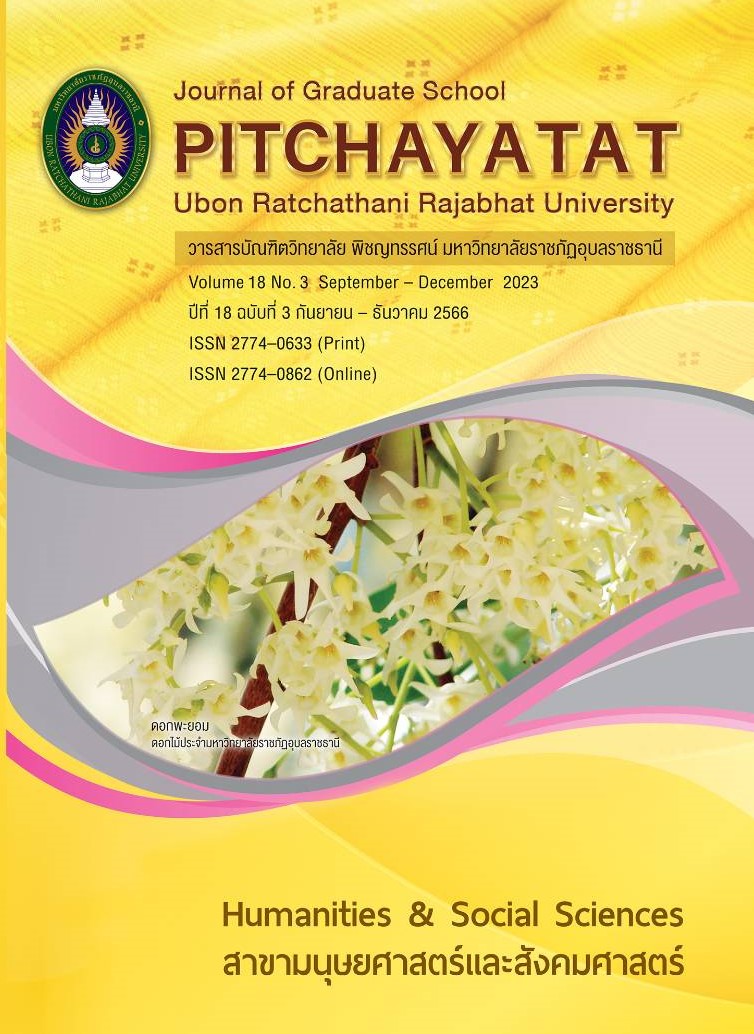The Academic Administration of the School Administrators Affecting the Learners’ Quality in the Schools under Samut Prakan Primary Educational Service Area Office 2
Keywords:
Academic Administration, School Administrators, Learners’ QualityAbstract
The objectives of the research were 1) to study the academic administration levels of the school administrators and the levels of the learners’ quality in the schools under Samut Prakan Primary Educational Service Area Office 2 and 2) to study the academic administration of the school administrators affecting the learners’ quality in the schools under Samut Prakan Primary Educational Service Area Office 2. The samples were 291 government teachers under Samut Prakan Primary Educational Service Area Office 2. They were randomized by stratified sampling. The sample size was determined by Krejcie and Morgan Table. The research instrument was a questionnaire. The statistics used were frequency, percentage, mean, standard deviation, and stepwise multiple regression analysis.
The research findings were as follows.
- The academic administration of the school administrators under Samut Prakan Primary Educational Service Area Office 2 in the overall was at a high level and the learners’ quality in the schools under Samut Prakan Primary Educational Service Area Office 2 in the overall was at a high level.
- The academic administration of the school administrators affected the learners’ quality in the schools with the statistical significance at the level of .05 and the predictive power was 0.618. These findings showed that the administration of the school administrators could predict the academic administration of the schools by 61.80, and the findings of the analysis of the best of the academic administration of the school administrators affecting the learners’ quality consisted of two variables: the development and the use of the technology media for education () and the development of the learning processes (). The two variables could be used to write the predictive equations from the raw score and the standard score as follows:
the predictive equation from the raw score: Y = 1.142 + . 416 (X5) + .241 (X3) + 111(X1) +.052 (X4) + .050 (X2) + (-.161) (X6)
the predictive equation from the standard score: Z = .508 (X5) + .258 (X3) + 112(X1) +.065 (X4) + .056 (X2) + (-.176) (X6)
References
กีรติ ฉิมพุฒ, สุพัฒนา หอมบุปผา และสาธร ทรัพย์รวงทอง. “การศึกษาความสัมพันธ์ระหว่างการบริหารงานวิชาการกับคุณภาพผู้เรียนในสถานศึกษา สังกัดสำนักงานเขตพื้นที่การศึกษามัธยมศึกษากำแพงเพชร,” วารสารครุศาสตร์ คณะครุศาสตร์ มหาวิทยาลัยราชภัฏนครสวรรค์. 5, 2 (พฤษภาคม–สิงหาคม 2565): 135-144.
นิรุทธ์ น่วมรัศมี และดำรงค์ เบญจคีรี. “การบริหารงานวิชาการที่ส่งผลต่อคุณภาพผู้เรียนในสถานศึกษาสังกัดสำนักงานเขตพื้นที่การศึกษามัธยมศึกษาเขต 1,” วารสารสถาบันวิจัยญาณสังวร. 13, 2 (กรกฎาคม–ธันวาคม 2565): 1-12.
นูรไลลา หลังปูเต๊ะ. การบริหารงานวิชาการของผู้บริหารสถานศึกษาในศูนย์เครือข่ายทุ่งยางแดง สังกัดสำนักงานเขตพื้นที่การศึกษาประถมศึกษาปัตตานีเขต 3. วิทยานิพนธ์ครุศาสตรมหาบัณฑิต มหาวิทยาลัยราชภัฏยะลา, 2565.
ปาริฉัตร โชติขันธ์. กลยุทธ์การบริหารงานวิชาการในสถานศึกษาขั้นพื้นฐาน สังกัดสํานักงานเขตพื้นที่การศึกษาประถมศึกษาร้อยเอ็ด เขต 2. วิทยานิพนธ์ศึกษาศาสตรมหาบัณฑิต มหาวิทยาลัยมหาสารคาม, 2560.
พรรษมน พินทุสมิต. การปฏิบัติงานด้านการบริหารวิชาการของผู้บริหารสถานศึกษาระดับ ประถมศึกษา ในจังหวัดปทุมธานี. วิทยานิพนธ์ศึกษาศาสตรมหาบัณฑิต มหาวิทยาลัยเทคโนโลยีราชมงคลธัญบุรี, 2560.
เลขาธิการการศึกษา, สำนักงาน. การติดตามและประเมินผลการจัดการศึกษาเพื่อการเรียนรู้ตลอดชีวิตของประเทศไทย, กรุงเทพฯ: สำนักงานเลขาธิการสภาการศึกษา, 2564.
วราพร สินศิริ. “การบริหารงานวิชาการของโรงเรียนในสังกัด สำนักงานเขตพื้นที่การศึกษามัธยมศึกษานนทบุรี,” วารสารมนุษยศาสตร์และสังคมศาสตร์. 7, 3 (กันยายน–ธันวาคม 2564): 129-146.
ศึกษาธิการ, กระทรวง. แนวทางการพัฒนาระบบการประกันคุณภาพการศึกษาตามกฎกระทรวงการประกันคุณภาพการศึกษา พ.ศ. 2561. กรุงเทพฯ: เอ็น.เอ.รัตนะเทรดดิ้ง, 2561.
ศราวุธ สุวรรณวรบุญ และธีร หฤทัยธนาสันติ์. “ปัจจัยที่ส่งผลต่อคุณภาพการสอนของครูโรงเรียนประถมศึกษาในจังหวัดชายแดนภาคใต้,” วารสารวิทยบริการ มหาวิทยาลัยสงขลานครินทร์. 30, 3 (กันยายน–ธันวาคม 2562): 1-15.
สารินทร์ เอี่ยมครอง. แนวทางการบริหารงานวิชาการของสถานศึกษาในจังหวัดชัยนาท สังกัดสำนักงานเขตพื้นที่การศึกษามัธยมศึกษา เขต 5. วิทยานิพนธ์ครุศาสร์มหาบัณฑิต มหาวิทยาลัยราชภัฏนครสวรรค์, 2561.
สุภาพร กล่อมมะโน และพรเทพ รู้แผ. “พฤติกรรมผู้นำทางวิชาการของผู้บริหารที่ส่งผลต่อการจัดการเรียนรู้ของครูในสถานศึกษา สังกัดสํานักงานเขตพื้นที่การศึกษาประถมศึกษาพระนครศรีอยุธยา เขต 1,” วารสารมหาจุฬาวิชาการ. 8, 2 (พฤษภาคม-สิงหาคม 2564): 172-187.
สุกัญญา แช่มช้อย. การบริหารงานวิชาการที่ตอบสนองการเปลี่ยนแปลงของโลกยุคพลิกผัน. กรุงเทพฯ: สำนักพิมพ์จุฬาลงกรณ์มหาวิทยาลัย , 2565.
สุกัญญาโสภี ใจกล่ำ และณริศรา พฤกษะวัน. “ผลการเรียนรู้ของนักเรียนระดับประถมศึกษาตอนปลายด้วยสื่อวีดิทัศน์เทคโนโลยี การศึกษาทางไกลผ่านดาวเทียม (DLTV) กลุ่มสาระการเรียนรู้สังคมศึกษา ศาสนา และวัฒนธรรม รายวิชาศาสนา ศีลธรรม จริยธรรม,” วารสารอักษราพิบูล. 3, 2 (กรกฎาคม-ธันวาคม 2565): 81-98.
อังคณา มาศเมฆ. การบริหารงานวิชาการกับคุณภาพผู้เรียนในโรงเรียนเทศบาลกลุ่มการศึกษาท้องถิ่นที่ 5. วิทยานิพนธ์ศึกษาศาสตรมหาบัณฑิต มหาวิทยาลัยศิลปากร, 2557.
อุทัย บุญประเสริฐ. หลักสูตรและการบริหารงานวิชาการของโรงเรียน. กรุงเทพฯ: เอสดีเพรส, 2557.
อภิชา พุ่มพวง. ปัญหาและแนวทางการพัฒนาการบริหารงานวิชาการโรงเรียนมัธยมศึกษาจังหวัดสมุทรปราการ สังกัดสำนักงานเขตพื้นที่การศึกษามัธยมศึกษา เขต 6. วิทยานิพนธ์การศึกษามหาบัณฑิต มหาวิทยาลัยบูรพา, 2559.
Krejcie, R. V. and D. W. Morgan, “Determining size for research activities,” Educational and Psychological Measurement. 30, 3 (September, 1970): 607-610.
Downloads
Published
How to Cite
Issue
Section
License
Copyright (c) 2023 Journal of Graduate School, Pitchayatat, Ubon Ratchathani Rajabhat University

This work is licensed under a Creative Commons Attribution-NonCommercial-NoDerivatives 4.0 International License.
Every article is peer-reviewed for academic correctness by at least three external qualified experts. The opinions in the Pitchayatat Journal (Humanities and Social Sciences) belong to the authors; not belong to the Publisher. Thus, Pitchayatat Journal cannot to be held responsible for them. The articles in this journal are protected by the copyright of Thailand. No part of each issue may be reproduced for dissemination without written permission from the publisher.





